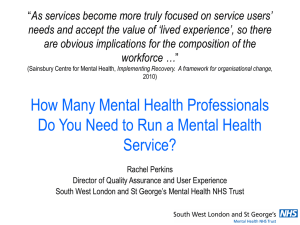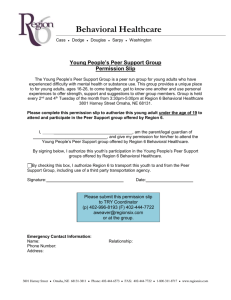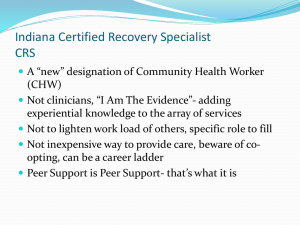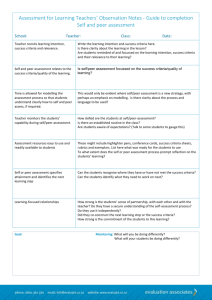White Paper and Teleconference Webinar July 18
advertisement
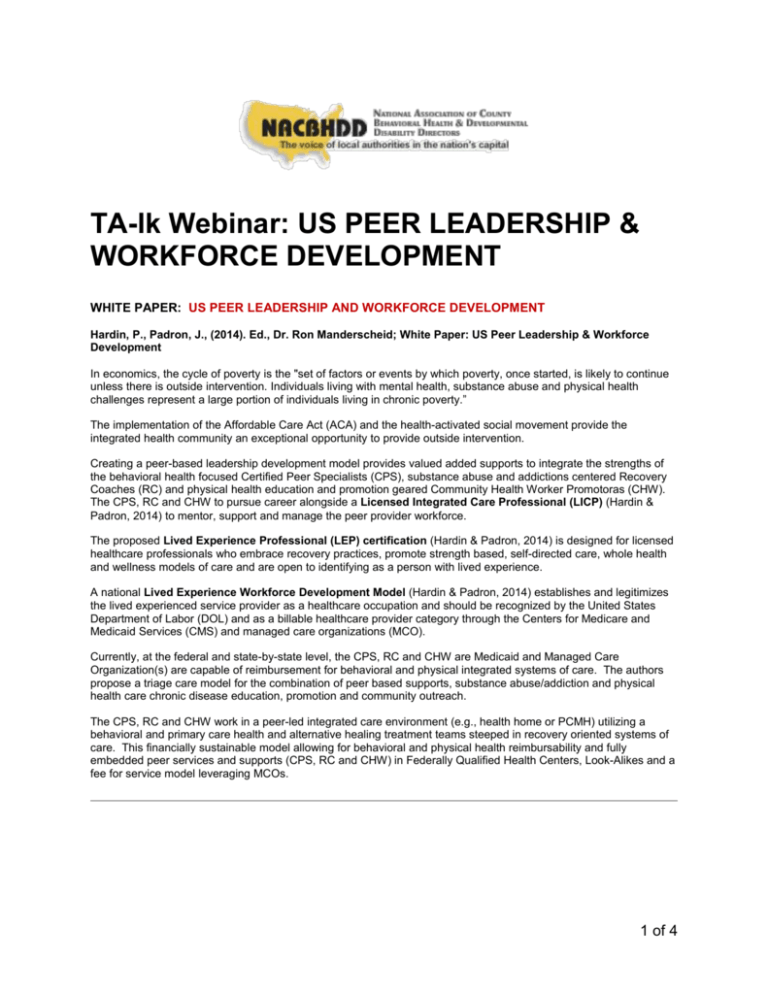
TA-lk Webinar: US PEER LEADERSHIP & WORKFORCE DEVELOPMENT WHITE PAPER: US PEER LEADERSHIP AND WORKFORCE DEVELOPMENT Hardin, P., Padron, J., (2014). Ed., Dr. Ron Manderscheid; White Paper: US Peer Leadership & Workforce Development In economics, the cycle of poverty is the "set of factors or events by which poverty, once started, is likely to continue unless there is outside intervention. Individuals living with mental health, substance abuse and physical health challenges represent a large portion of individuals living in chronic poverty.” The implementation of the Affordable Care Act (ACA) and the health-activated social movement provide the integrated health community an exceptional opportunity to provide outside intervention. Creating a peer-based leadership development model provides valued added supports to integrate the strengths of the behavioral health focused Certified Peer Specialists (CPS), substance abuse and addictions centered Recovery Coaches (RC) and physical health education and promotion geared Community Health Worker Promotoras (CHW). The CPS, RC and CHW to pursue career alongside a Licensed Integrated Care Professional (LICP) (Hardin & Padron, 2014) to mentor, support and manage the peer provider workforce. The proposed Lived Experience Professional (LEP) certification (Hardin & Padron, 2014) is designed for licensed healthcare professionals who embrace recovery practices, promote strength based, self-directed care, whole health and wellness models of care and are open to identifying as a person with lived experience. A national Lived Experience Workforce Development Model (Hardin & Padron, 2014) establishes and legitimizes the lived experienced service provider as a healthcare occupation and should be recognized by the United States Department of Labor (DOL) and as a billable healthcare provider category through the Centers for Medicare and Medicaid Services (CMS) and managed care organizations (MCO). Currently, at the federal and state-by-state level, the CPS, RC and CHW are Medicaid and Managed Care Organization(s) are capable of reimbursement for behavioral and physical integrated systems of care. The authors propose a triage care model for the combination of peer based supports, substance abuse/addiction and physical health care chronic disease education, promotion and community outreach. The CPS, RC and CHW work in a peer-led integrated care environment (e.g., health home or PCMH) utilizing a behavioral and primary care health and alternative healing treatment teams steeped in recovery oriented systems of care. This financially sustainable model allowing for behavioral and physical health reimbursability and fully embedded peer services and supports (CPS, RC and CHW) in Federally Qualified Health Centers, Look-Alikes and a fee for service model leveraging MCOs. 1 of 4 TA-lk Webinar: US PEER LEADERSHIP & WORKFORCE DEVELOPMENT Join us for a Webinar on June 18 Space is limited. Reserve your Webinar seat now at: https://www1.gotomeeting.com/register/881761328 This TA-lk Webinar will inform and inspire, and show how to take action. The focus will be improving US peer leadership and US domestic workforce development utilizing Certified Peer Specialists (CPS), Recovery Coaches (RC), and Community Health Worker Promotoras (CHW), together with Licensed Integrated Care Professionals (LICP), in an integrated care environment via the Lived Experience Workforce Development model. It also will increase awareness of current innovative and emergent effective models, programs, initiatives, and services specifically designed for peers, persons in recovery, and those working in integrated care settings (e.g., Health Homes, Person Centered Medical Homes, Federally Qualified Health Centers). Title: TA-lk Webinar: US PEER LEADERSHIP & WORKFORCE DEVELOPMENT Date: Wednesday, June 18, 2014 Time: 3:30 PM - 4:30 PM EDT After registering you will receive a confirmation email containing information about joining the Webinar. FEATURED SPEAKERS Pamela Hardin, MBA, M.Ed, Instructional Designer, State of Texas HHSC; Principal Investigator and CoAuthor, “White Paper: US Peer Leadership and Workforce Development” 2 of 4 Ken Minkoff, MD, Clinical Assistant Professor of Psychiatry, Harvard University Medical School; Representataive, BRSS TACS Advisory Council, Representative, American Association of Community Psychiatrists; Senior Policy Partner, Meadows Mental Health Institute for Texas; Senior System Consultant, ZiaPartners, Inc., San Rafael, California John Brekke, PhD,Professor, Frances G. Larson Professor of Social Work Research, University of Southern California School of Social Work OBJECTIVES Define a policy framework for maximizing access to integrated peer support and recovery support in a recovery oriented integrated system of care. Describe the pros and cons of various strategies and approaches to expanding peer support and the peer workforce. Identify the primary reason people with mental illness and/or substance abuse issues die an average of 25 years earlier than the general population. Identify three peer support entry level paid positions. Identify who benefits when lived experience and taking personal responsibility for health and wellness are respected instead of stigmatized. TARGET AUDIENCE US Certified Peer Specialists, Recovery Coaches and Community Health Worker Promotoras; Peers and persons in recovery, current and past recipients of mental health and substance abuse services, and family members; Peer-run and provider organizations; Community- and faith-based organizations that support individuals with mental and substance use disorders; State, county behavioral health departments; 3 of 4 Federally Qualified Health Centers and Look-Alikes; Health Homes and Person Centered Medical Homes; Policy makers and decision makers; Integrated behavioral health and physical health care providers. System Requirements PC-based attendees Required: Windows® 8, 7, Vista, XP or 2003 Server Mac®-based attendees Required: Mac OS® X 10.6 or newer Mobile attendees Required: iPhone®, iPad®, Android™ phone or Android tablet 4 of 4



